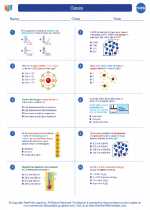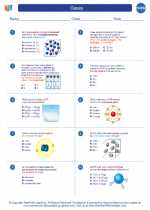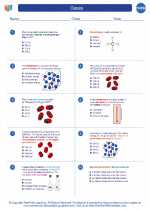Impurities in Chemistry
Impurities in chemistry refer to substances that are present in a material in small quantities, but can significantly affect its properties. These impurities can arise from the manufacturing process, environmental exposure, or intentional addition for specific purposes.
Types of Impurities
There are two main types of impurities:
- Foreign Impurities: These are substances that are not part of the main material. They can be introduced during the production process or can enter the material from the surroundings.
- Intrinsic Impurities: These impurities are part of the main material but are present in unintended amounts. They can result from the production process or from the natural occurrence of the material.
Effects of Impurities
Impurities can have a significant impact on the properties of a material:
- Physical Properties: Impurities can alter the melting point, boiling point, density, and other physical properties of a material.
- Chemical Properties: Impurities can affect the reactivity, stability, and other chemical properties of a substance.
- Mechanical Properties: Impurities can influence the strength, ductility, and other mechanical properties of a material.
Methods of Purification
In order to remove impurities from a material, various purification methods can be employed:
- Crystallization: This method involves dissolving the impure substance in a solvent and allowing it to crystallize, leaving impurities behind.
- Distillation: Distillation utilizes differences in boiling points to separate the main substance from impurities.
- Filtration: Filtration is used to separate solid impurities from a liquid or gas.
- Chromatography: This method separates different components of a mixture based on their differential affinities for a stationary phase and a mobile phase.
Study Guide
When studying impurities in chemistry, it is important to:
- Understand the different types of impurities and their sources.
- Learn about the effects of impurities on the properties of materials.
- Be familiar with the various methods of purifying substances.
- Practice identifying impurities in a given material and determining the most suitable purification method.
By mastering the concept of impurities, you will gain a deeper understanding of the behavior of materials and the importance of purity in chemical substances.
.◂Chemistry Worksheets and Study Guides High School. Gases
The resources above cover the following skills:
Physical Science
Energy - A. Energy is involved in all physical and chemical processes. It is conserved, and can be transformed from one form to another and into work. At the atomic and nuclear levels energy is not continuous but exists in discrete amounts. Energy and mass are related through Einstein's equation E=mc 2 . B. The properties of atomic nuclei are responsible for energy-related phenomena such as radioactivity, fission and fusion. C. Changes in entropy and energy that accompany chemical reactions influence reaction paths. Chemical reactions result in the release or absorption of energy. D. The theory of electromagnetism explains that electricity and magnetism are closely related. Electric charges are the source of electric fields. Moving charges generate magnetic fields. E. Waves are the propagation of a disturbance. They transport energy and momentum but do not transport matter.
Relate temperature to the average molecular kinetic energy.



